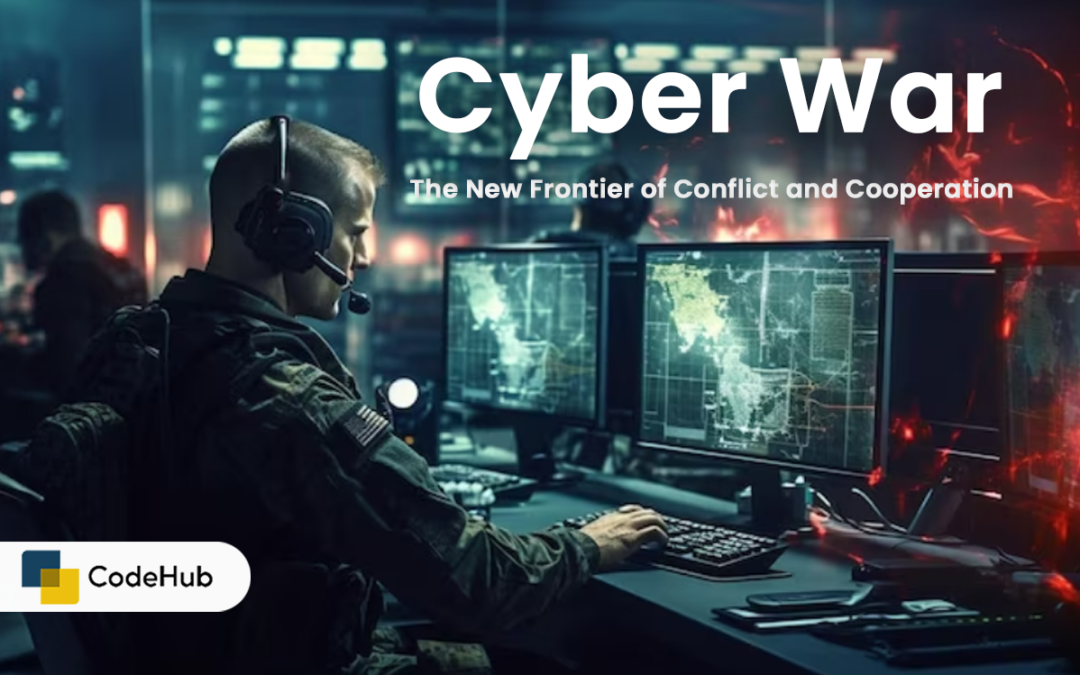Cyber war is the use of cyberattacks against an enemy state, causing comparable harm to actual warfare and/or disrupting vital computer systems. Cyber war can involve various actors, such as states, non-state actors, hackers, or terrorists, and can target various sectors, such as government, military, industry, or civil society. Cyber war can have various motives, such as espionage, sabotage, propaganda, manipulation, or economic warfare.
Cyber war is not a new phenomenon, but it has become more frequent and sophisticated in recent years, thanks to the advances in technology, such as artificial intelligence, biotechnology, blockchain, and quantum computing. Cyber war poses new challenges and opportunities for international security and cooperation, as it can escalate or de-escalate conflicts, create new alliances or rivalries, and shape the norms and rules of cyberspace.
In this blog post, we will explore some of the current and future trends and implications of cyber war, and how it can affect the world and our lives.
Cyber War and International Security
Cyber war can have a significant impact on international security, as it can threaten the sovereignty, stability, and prosperity of states and regions. Cyber war can also affect the balance of power and the deterrence capabilities of states, as it can create new asymmetries and vulnerabilities, and challenge the traditional concepts of warfare and defense.
For example, cyber war can enable smaller or weaker states to challenge larger or stronger states, by exploiting their cyber weaknesses or by using cyber proxies or mercenaries. Cyber war can also undermine the credibility and effectiveness of nuclear deterrence, by disrupting the command and control systems or by creating false alarms or signals. Cyber war can also blur the distinction between war and peace, by creating ambiguity and uncertainty about the origin, intention, and impact of cyberattacks, and by making it difficult to attribute responsibility and to respond proportionately.
However, cyber war can also create new opportunities for international security and cooperation, as it can foster dialogue and trust, promote confidence-building measures, and encourage the development of norms and regulations. Cyber war can also facilitate the resolution of conflicts, by creating channels of communication and negotiation, by providing alternatives to kinetic violence, and by creating common interests and challenges.
For example, cyber war can encourage states to engage in bilateral or multilateral talks and agreements, to prevent or manage cyber crises, to share information and best practices, and to establish rules of the road and red lines. Cyber war can also help states to address common threats and issues, such as cyber terrorism, cybercrime, or cyber espionage, by enhancing their cooperation and coordination, by providing mutual assistance and support, and by creating joint mechanisms and platforms.
Cyber War and Society
Cyber war can also have a significant impact on society, as it can affect the rights, freedoms, and well-being of individuals and groups. Cyber war can also affect the values, norms, and cultures of society, as it can influence the perception, behavior, and identity of people and communities.
For example, cyber war can threaten the privacy and security of individuals and groups, by exposing or stealing their personal or sensitive information, by manipulating or blackmailing them, or by harming or harassing them. Cyber war can also undermine the democracy and governance of society, by interfering or influencing the electoral processes, by spreading misinformation or propaganda, or by disrupting or sabotaging the public services and infrastructure.
However, cyber war can also create new opportunities for society, as it can empower and educate individuals and groups, promote social and political participation and activism, and foster diversity and inclusion. Cyber war can also inspire innovation and creativity in society, by stimulating new ideas and solutions, by creating new markets and opportunities, and by enhancing the digital literacy and skills of people and communities.
For example, cyber war can enable individuals and groups to access and share information and knowledge, to express and communicate their opinions and views, and to organize and mobilize for their causes and interests. Cyber war can also help individuals and groups to challenge and resist oppression and injustice, to expose and report corruption and wrongdoing, and to advocate and campaign for their rights and freedoms.
Conclusion
Cyber war is the use of cyberattacks against an enemy state, causing comparable harm to actual warfare and/or disrupting vital computer systems. Cyber war can have various impacts on international security and society, as it can create new challenges and opportunities, and as it can affect the balance of power, the deterrence capabilities, the sovereignty, the stability, the prosperity, the rights, the freedoms, the well-being, the values, the norms, and the cultures of states and regions, individuals and groups, and people and communities.
Cyber war is not a new phenomenon, but it has become more frequent and sophisticated in recent years, thanks to the advances in technology. Cyber war poses new questions and dilemmas for the world and our lives, such as how to define, prevent, and respond to cyberattacks, how to attribute responsibility and accountability for cyberattacks, how to balance security and freedom in cyberspace, and how to cooperate and coexist in cyberspace.
We hope you enjoyed reading this blog post, and learned something new and interesting about cyber war. If you have any questions, comments, or feedback, please feel free to share them with us. Thank you for your attention and interest.

